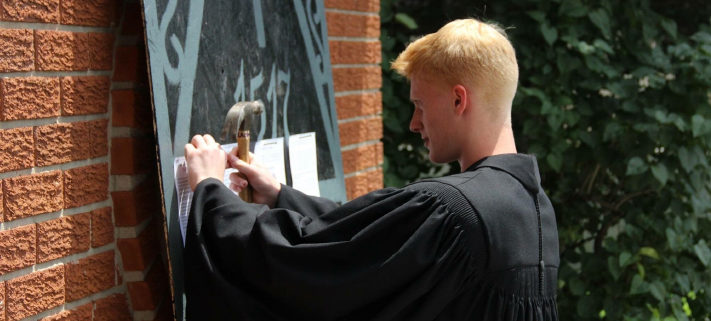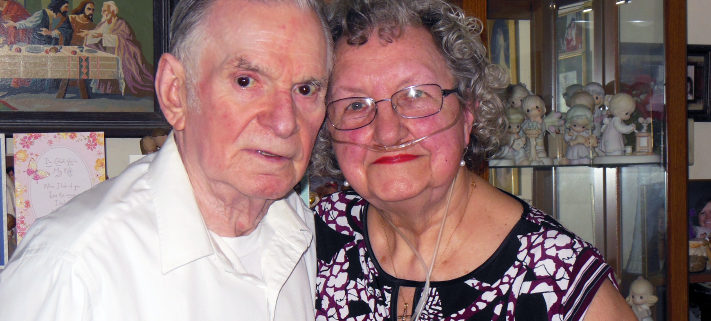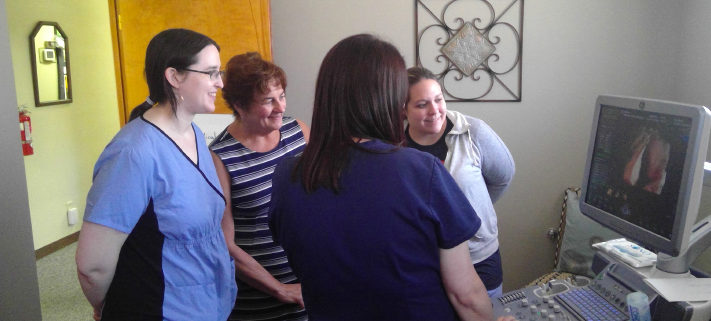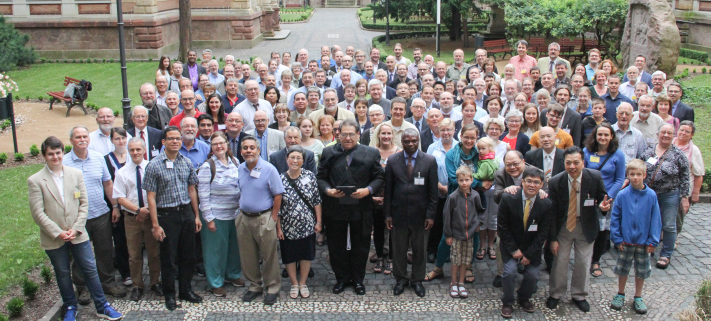Celebrating the Reformation
WELS congregations are using the 500th anniversary of the Reformation as an opportunity to educate their members about Martin Luther and his teachings, as well as to reach out into their communities to share God’s gospel message. Here are just a few examples. Learn more about synodwide Reformation events at wels.net/reformation500.
Alma, Michigan
It started out as a “small Luther display that we could use to adorn the building for the Reformation celebration,” says John Eich, pastor at Good Shepherd, Alma, Mich. It ended up including a life-sized Martin Luther nailing the Ninety-five Theses to the Castle Church door, several vignettes including the Diet of Worms and Luther’s study in the Wartburg Castle, and a mini-golf course depicting the places Luther lived and worked.
Members Heidi McDaid and Sandy Sheldon, along with Eich, spent hundreds of hours researching the Reformation and Luther’s life and creating the displays. “We started this project with 4 appliance boxes, 19 sheets of cardboard, 10 sheets of foam, Gorilla tape, a gallon of paint, and an endless amount of glue sticks,” says McDaid. Other unique building materials include disposable oil pans, pool noodles, hula hoops, wind chimes, and dryer vent Flex tubes.
Written narratives by each display further educate members about Luther’s life and teachings, and activities such as a working printing press in Gutenberg’s printshop bring the Reformation era to life.
“On Sunday morning, the congregation is always looking for the latest addition to ‘Lutherland’ and as they gather around it, the conversations start, the fingers are pointing, and parents are explaining Martin Luther’s life to their children,” says McDaid. “When you see this, you know it was all worth it!”
But the displays are not only for the congregation to enjoy. Good Shepherd held an open house for the community and a special weekend vacation Bible school, complete with lessons and games for the children and an adult Bible class on the Large Catechism. The weekend ended with a German potluck and a presentation on Martin Luther’s homeland.
Eich says the anniversary of the Reformation is a wonderful opportunity to celebrate our heritage as confessional Lutherans and to share it with others. “We can let the community know that there is something different about being Lutheran—we’re not just another Christian denomination. What a blessing this could be if we really promote that in the community, and people begin, by God’s grace, to understand just how special it is to have grace alone, faith alone, and Scripture alone.”
Nepean, Ontario, Canada
Divine Word, Nepean, Ontario, Canada added a special outreach event to the end of its summer vacation Bible school. Building on its theme “Mighty Fortress,” the event included a bouncy castle and jousting, a petting zoo and pony rides, and a barbecue. But the main part of the event was the Reformation walk. Every hour, tour groups visited different stations that explained more about the Reformation, including the nailing of the Ninety-five Theses, John Tetzel and indulgences, the Wartburg Castle, law/gospel and means of grace.
“The event was a hit! We had the community walking off the street to see what was going on,” says Rachel Halldorson, member at Divine Word. “The bouncy castle and zoo animals may have drawn them in, but it was the Reformation walk that shared the truth of God’s Word and taught them about history and how God used Luther to rediscover the gospel truth.”
Tempe, Arizona
The fifth through eighth grade art class at Emmanuel, Tempe, Ariz., made two recycled bottle cap murals of the Luther seal to celebrate the 500th anniversary of the Reformation. Congregation members donated hundreds of bottle caps for the project. “What a neat way for the students to express their artistic abilities and remember what the Luther Seal means to us and our heritage,” says Amber Bode, congregation member.
SUBMIT YOUR STORY
Do you have a manuscript, idea, or story from your own life you’d like to share for use in Forward in Christ or on wels.net? Use our online form to share it to our editorial office for consideration.
SUBSCRIBE TO FORWARD IN CHRIST
Get inspirational stories, spiritual help, and synod news from Forward in Christ every month. Print and digital subscriptions are available from Northwestern Publishing House.
Author:
Volume 104, Number 9
Issue: September 2017
Copyrighted by WELS Forward in Christ © 2021
Forward in Christ grants permission for any original article (not a reprint) to be printed for use in a WELS church, school, or organization, provided that it is distributed free and indicate Forward in Christ as the source. Images may not be reproduced except in the context of its article. Contact us








